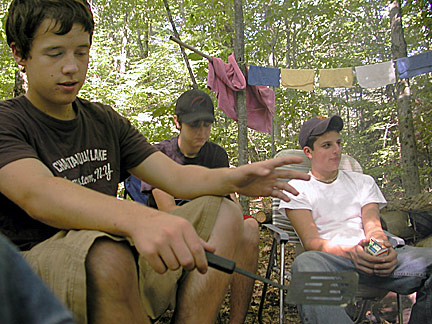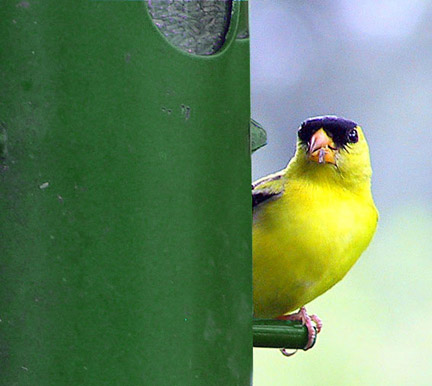
Matt flipping those cakes. Robby and Joe.

Leaf on a silk thread.
Monthly Archives: September 2003
Breakfast
Sunday morning Matthew announced that he and Daryl were going to cook
breakfast.

Matt’s perfect pancake in spite of three adults sitting back in their
easy chairs telling him they could do a better job.

A dozen eggs (scrambled) in one sauce pan cooked over flames that
threaten to incinerate the chef. They too were perfect.
Undocked

There is a dock, or a platform, or a whateveryoucallit, that is anchored by cinderblocks in Spoonsà Pond, about fifty feet from the dock that is a dock, as in a land based boat dock, except there are no boats that dock to it. Anyway, the boys got this brilliant idea to pull up the anchor of the floating dock and paddle it to where we were, on the dock, dock. To my knowledge, this was a first. Click on the image, itÃs worth a closer look.
More than Semantics
How about missing that which is right in front of you? A scratch ticket with the winning numbers? The solution to a puzzle? A street sign?
HereÃs one of mine. Late fall, 1980, while I was working at Emerson Hospital as a respiratory therapist.
ì I feel sick. Is it hot in here? IÃm sweating, but I feel cold.î
MarthaÃs forehead glistened with small beads of perspiration. Adjusting the oxygen in her air conditioned room, and nearing the end of my shift, I was in a hurry to finish. Minutes before, she was attached to monitors in the Coronary Care Unit; now deemed stable, she had moved a floor closer to home.
Martha wiped her face with the loose sleeve of her johnny and repeated her question, ìWhy am I sweating?î She looked worried and embarrassed to be complaining, a mother accustomed to taking care of, not being cared for. I looked, I listened and I dismissed it all. Here I stood, in my white lab jacket; there she lay, looking for reassurance. That I could give. Help, apparently not.
I left Martha, sweating, but not diaphoretic. Had I thought diaphoretic would I have alerted her doctor? The head nurse? Diaphoretic implies a medical cause for sweat. Associated with heart attacks it is often accompanied by a sense of foreboding. In hospitals it is rarely mentioned without its companion, chest pain. But I only saw sweat.
I told her, ìYouÃll be okay. ”
Ten minutes later, and back in our office preparing my patient report for Dave, the gangly night guy, I heard the code. I didn’t need a nurse to shout the room number. I didnÃt need to stare at MarthaÃs upside down face to know it was she. Between chest compressions, I slid the endotracheal tube past her beige vocal cords.
Two Birds

Shingles

Matt and Chris stipping shingles from Chris’s garage roof and getting
paid a minimum wage busting $15.00/hr

Up close: Chris Grojean, Robby Nadler, Matthew Miller
Alives, Revivals, Survivals and Arrivals
A wonderfully written essay I’ve read many times.
Each reading reveals more, and while I understand her
cancer, her mother, her relation to Anne Sexton, I still
don’t fully understand survivals or arrivals.
Laboriously typed for those far better versed in the subjunctive than
I : Adam, Susan and Diane.
STUDIES IN THE SUBJUNCTIVE
If I were to write you a letter on a card from a collection entitled “Autumn Leaves,” this is what I would say: Today is Anne Sexton’s birthday. Would you wonder how I knew? Would you remember, even in November, the calendar you gave me? She would have been 73 today. Or would not be. She could be dead of cancer(all those cigarettes! all that alcohol! her mother’s painful extinction at 58) The subjunctive’s sharp blade can cut in more ways than suicide.
If I try to imagine the knife, I cannot. It must have been steel and sharp, but was it serrated? It must have been accompanied by others, some smaller, some longer. How odd to feel the serious effects of an event for which I have no memory. Which is the purpose of anesthesia after all. The surgeon warned I might not survive. But after eight hours of cutting, I was still alive. The tumor was not.
Though all care be exercised, the letter could be fatal. Once my worry was that my card would contain some embarrassing grammatical error. Or at the most severe, with no Ariadne to guide it to liberation. But now I imagine my creme-colored and rust-lined but still porous envelope which just happens to be poisonous. It might be that I have sent spores to you when I meant to send a cheery greeting. anthrax is now a part of our vocabulary.
Live life normally! The imperative from public officials. From my doctors. And so I try to continue my letter to you on Anne Sexton’s birthday. Deciding to forgo her conditional age in favor of her unconditional poetry, I consult my bookshelves, brimming with what my mother once cursed as my vanity. My twenty-five-year-old paperbacks are infested with microscopic organisms: mold or even paper mites. I sneeze (could this be a symptom of something else?) as I look for an appropriate quote with which to begin. Something so serve as an epigraph. We are nothing if not literary; even our letters have inscriptions, like tombs. but my inspection of the book is distracted by under-lining. In ink?
What a pompous college student I must have been. Thank goodness you didn’t know me then. I often wondered whether, if my family had believed in poetry or the rules of grammar or that language could solve or soothe or be useful. I might have continued a career in literature. I might have not been so intimidated by the professors with their perfect accents and syntax. I might not have been mortified when I was directed to Fowler’s A Dictionary Of Modern English Usage (and make sure you get the third edition) after I handed in my paper on The Uses of Ocean Metaphors in the Poetry of Anne Sexton.
Now that the subjunctive is dying…This from the third edition, 1938. Anne Sexton would have been ten years old and my mother would have been one year old and the renowned H.W. Fowler would have been delighted about his
work’s immortality if he were alive. The subjunctive is, except in isolated uses, no longer alive. Isolated in a suburban house seems better than being isolated in poverty. What if my mother had had the privilege of Anne Sexton? She probably still would have been depressed, but she would have been smarter about it. Or at least she could have driven a convertible bought by her father, the wool-factory owner, rather than walking to her job in the garment factory as a pregnant teenager.
Anne Sexton’s psychiatrists thought it was only a matter of time. Isn’t that what they always say, these doctors who chose the mind over getting their hands dirty? Before I found the surgeon who would agree to operate, other doctors
recommended a psychiatrist who would assist me in accepting my death. I did not come from a family that believed that money should be wasted on a luxury like therapy. Wasn’t that lucky?
In THE AWFUL ROWING TOWARDS GOD, this is what I have underlined:
pounding tides, the surf biting the shore, the sea that bangs in my throat, the sea
without which there is no mother, the surf pushes their cries back. There is the kind of reader who feels compelled to decorate her books with her own comments, little notes to the writer as if the author could read them, as if the author would be interested. I have not been her kind. But in this book, there exists one phrase of marginalia: extended metaphor. My handwriting is careful. Just as it must have been on my paper, The Uses of Ocean Metaphors in the Poetry of Anne Sexton, produced before the age of personal computers and at an age when I was too poor to purchase a typewriter. Somewhere in the universe, if only in the past, this paper still exists, echoing on the envelopes I would grace with my return address: Ocean Avenue, North Sea Drive, Tidewater Lane, Shore Blvd. Sexton’s poem At the Beach House made me cry for what I did not have, would never have. Sexton’s poem Doctors (They are not Gods/ though they would like to be,) I had ignored. Today, at the inland post office, the postwoman
comments on the beautiful calligraphy that graces my envelopes, announcing my prosaic return address. Now that all mail is suspicious, that it could wind its way through the body in ways that could be uncurable, I find her compliments comforting, talismatic. I would hope my doctors would be her kind.
Fowler classifies the uses of the subjunctive into four categories: alives, revivals, survivals, and arrivals. The alives consist of imperatives and conditionals in which no one could suspect the writer of pedantry or artificiality. (I wish it were over is the example provided by the ordinary writer, who cannot but sound antiquated should he write If ladies be but young and fair. The survivals are not incorrect grammatically, but they diffuse an atmosphere of fullness and formalism over the writing in which they occur. Most objectionable, the arrivals are the best proof that they subjunctive should be put to rest: infected at it is with the illnesses of mixed mood, sequences of tenses, indirect questions, and the dangerous miscellaneous, risking pretentiousness. A risk Sexton avoided with her direct accessible language. too direct, some critics declared.
If it were fall and it were 1974, Anne Sexton would be newly dead, and I’d be in college, and H.W.Fowler would still be dead, and I’d be drinking vodka in water glasses, and my mother would be threatening suicide, but my girlfriend would actually commit it. Not neatly in the garage, like Ms. Sexton in her cherished red car, but as colorfully daring as the dying leaves in New England. Blood splattered on the sidewalk in front of her house. In autumn, the sea doesn’t dry up, but it might as well.
Were, in the subjunctive sense, is applicable not to past facts, but to present or future non-facts which belong to utopia. Fowler is quite precise on this. But to understand the exactitudes of grammar, one has to have an acquaintance with the basics. Before I went to school, the word were was a place of mystery to me, a utopian where. The past, present, and future were not tenses of verbs, but the captives of then, now, maybe someday. Listen to my mother talk: We was going to get there then, but they was late and so we go nowhere. No were.
Where you were that morning: in the CT machine at the cancer center; stopping for a bagel, cream cheese, no butter please; sleeping late with a former lover, sweaty with regrets that will soon dry small; on the plane you almost didn’t make, feeling lucky to be going from Boston to L.A. for an interview; finishing the carpeting job in Queens before heading to the project downtown; at the Pentagon cookie shop, selling the last macadamia and chocolate chip; in the student lounge, looking up from the television set to se the same smoke, the same absence; at the veterinarians’s office, picking up the dog’s ashes; on the ledge, holding his hand, considering a choiceless choice; in the cockpit, between the sky and the ocean, aiming for the skyscraper’s promise on Chambers Street, using a briefcase as a shield; cradled in the stairwell, counting the flights, coughing and crying, dialing the cell phone, battery dead; in a place that will never be forgotten, never remembered, in heaven, in hell, in shock, in pieces, in tears, in a rage, incomprehensible, inarticulate.
Having revived.
Having arrived on the other side of some deep but invisible ocean. On the continent of those about whom the word miracle is whispered, I am still possessed of Fowler’s and my mother and my handwriting and my long for a beach house. Only now I don’t understand suicide. Only now I am suspicious of Anne Sexton (and the others, the others) for their deception: that death is romantic and not full of dullness and formalism; that death is literary and survivable.
Only now I wonder if Sexton (or Plath or Virginia Woolf…not to mention Hemingway) would have been diagnosed with a rare and almost always fatal cancer instead of depression; would she have fought her way into the clinical trials, past the doubting doctors, screaming I am but young and fair, too young to die. I am only 45, 30, 59, or 42 like me; or would she have succumbed, welcoming the morphine the doctors would provide in excess, as if they are gods and this is mercy.
If I were to continue my letter to you on Anne Sexton’s birthday, inside the card with the images of the yellow gingko leaves and red maple leaves and the towering trees we once would have described as aflame but can no longer since we have seen what we have seen, I might still insist on trying to turn lines from Sexton into aphorisms with my careful inscriptions. In November counting the stars/ gives you boils. Be careful of words/ even the miraculous ones. Many humans die./ They die like tender, palpitating berries/ in November. I would not write you how my abdomen still twists, a labyrinth constructed by my surgeon, my Ariadne, my rowing god with his oars of knives. Of the dangerous miscellany of my side-effects, seeming to mimic the symptoms of anthrax poisoning, now that we know what the symptoms would be. I cannot but sound antiquated should I write: if oceans be but metaphors, then what is this salt that clings to my scars? And I would not but sound too much the poetic writer rather than the ordinary one,should I write you, my dear, that I struggled to get past the subjunctive ( what if? if not?) every day, including this brilliant November day when the waves twist from a far off hurricane and we still strive in our boats hewn of grammar to arrive at utopia, or at least into some future.
By Ruthann Robson published in Bellevue Literary Review Spring 2003
Our Parents
Our parents died at least twice,
the second time when we forgot their stories,
or couldn’t imagine how often they craved love,
or felt useless, or yearned for some justice
in this world. In their graves, our parents’ need
for us is pure, they’re lost without us.
Their honeymoon in Havana does or does not
exist. That late August in the Catskills-
we can decide to make them happy.
What is the past if not unfinished work,
swampy, fecund, seductively revisable?
One of us has spent his life developing respect
for the weakness of words, the other for what
must be held on to; there may be a chance for us.
We try to say what happened in that first house
where we were, like most children, the only
needy people on earth. We remember
what we were forbidden, who got the biggest slice.
Our parents, meanwhile, must have wanted something
back from us, We know what it is, don’t we?
We’ve been alive long enough.
Stephen Dunn
"Piglet'

Anyone who has fed a goldfinch would understand Diane’s nickname for them.
(Taken with Dan’s camera)
“Piglet’

Anyone who has fed a goldfinch would understand Diane’s nickname for them.
(Taken with Dan’s camera)
Not Paint Chips

A better but not complete view of the twenty-four foot high ceiling.

Believe me, Mark, Adam and I appreciated the breakfast we made at
your house yesterday morning. Nevertheless, because we (this includes Jan) know that you are not about to throw away the remaining mix, I am posting this to remind you of what pancakes should look like.
